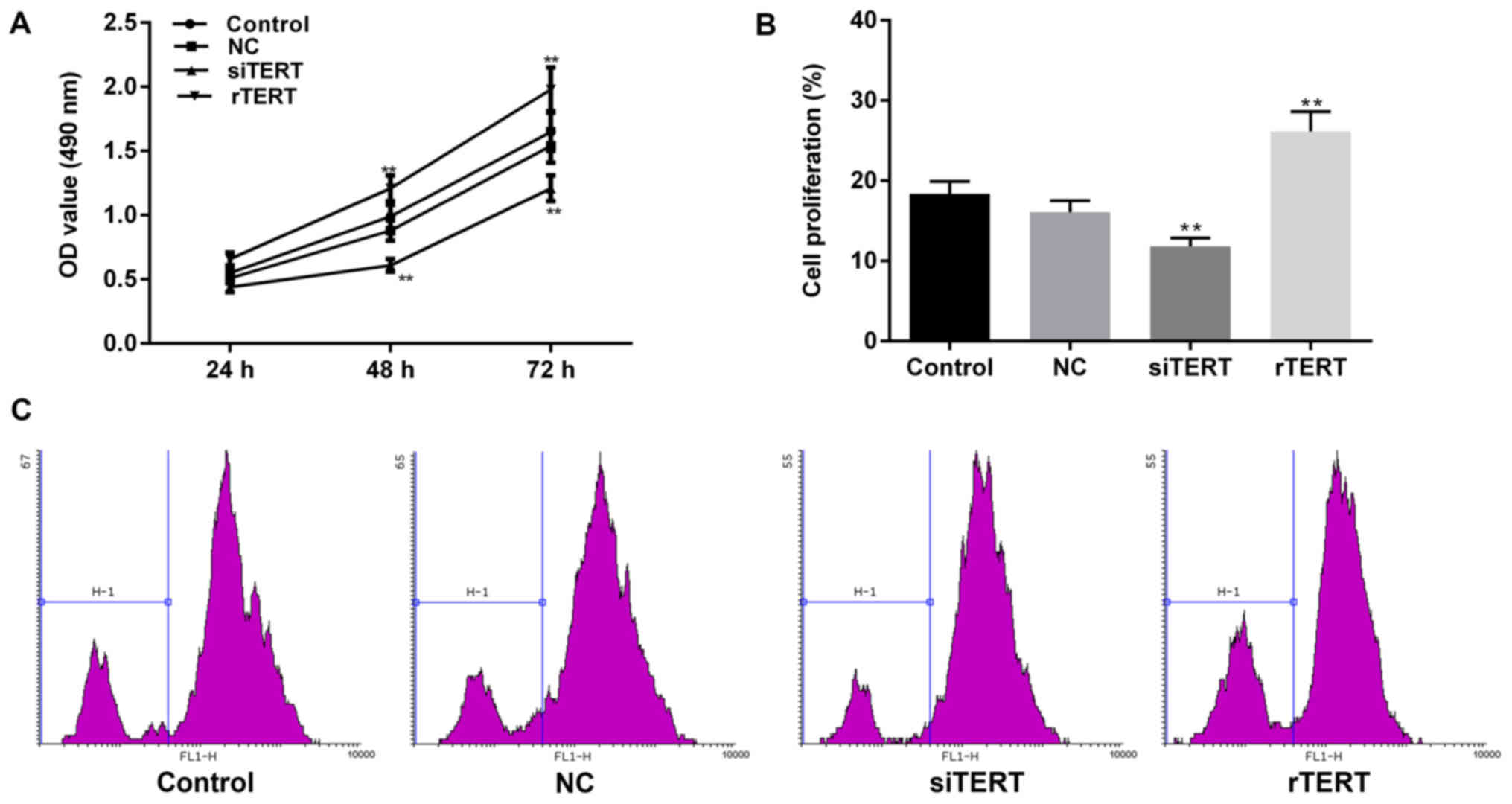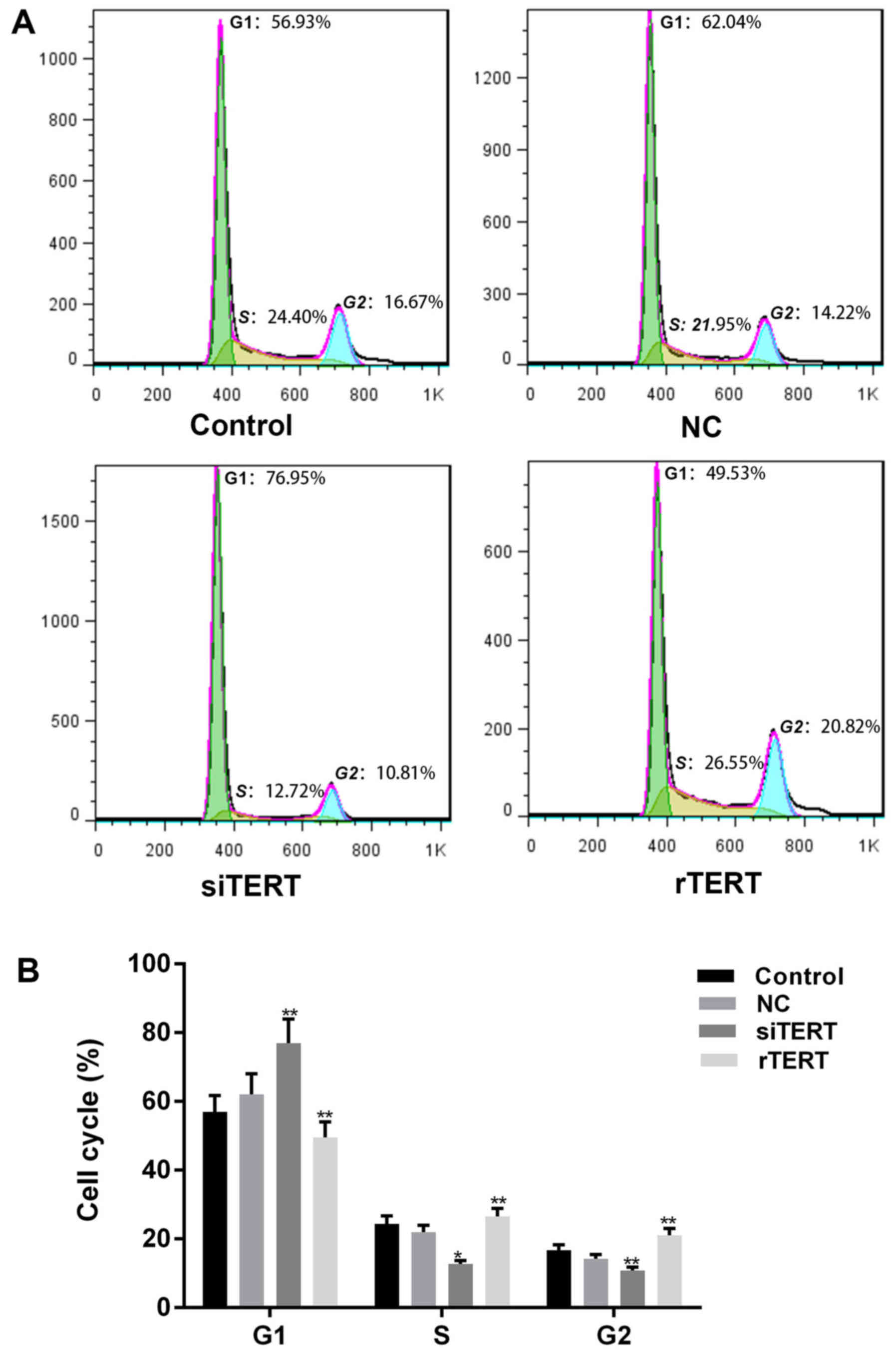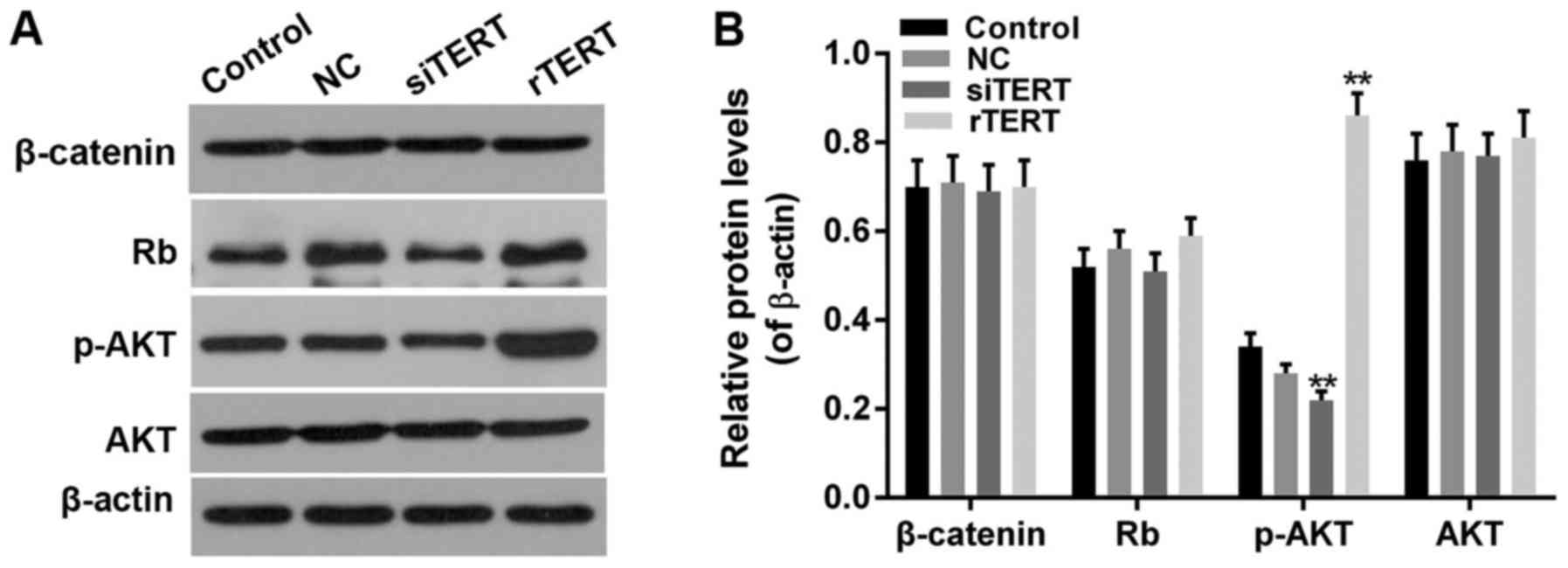|
1
|
Davies L and Welch HG: Increasing
incidence of thyroid cancer in the United States, 1973–2002. JAMA.
295:2164–2167. 2006. View Article : Google Scholar : PubMed/NCBI
|
|
2
|
Wang Y and Wang W: Increasing incidence of
thyroid cancer in Shanghai, China, 1983–2007. Asia Pac J Public
Health. 27:NP223–NP229. 2015. View Article : Google Scholar : PubMed/NCBI
|
|
3
|
Albores-Saavedra J, Henson DE, Glazer E
and Schwartz AM: Changing patterns in the incidence and survival of
thyroid cancer with follicular phenotype-papillary, follicular, and
anaplastic: A morphological and epidemiological study. Endocr
Pathol. 18:1–7. 2007. View Article : Google Scholar : PubMed/NCBI
|
|
4
|
Wynford-Thomas D: Origin and progression
of thyroid epithelial tumours: Cellular and molecular mechanisms.
Horm Res. 47:145–157. 1997. View Article : Google Scholar : PubMed/NCBI
|
|
5
|
Gomez DE, Armando RG, Farina HG, Menna PL,
Cerrudo CS, Ghiringhelli PD and Alonso DF: Telomere structure and
telomerase in health and disease (review). Int J Oncol.
41:1561–1569. 2012. View Article : Google Scholar : PubMed/NCBI
|
|
6
|
Beier F, Foronda M, Martinez P and Blasco
MA: Conditional TRF1 knockout in the hematopoietic compartment
leads to bone marrow failure and recapitulates clinical features of
dyskeratosis congenita. Blood. 120:2990–3000. 2012. View Article : Google Scholar : PubMed/NCBI
|
|
7
|
Autexier C and Lue NF: The structure and
function of telomerase reverse transcriptase. Annu Rev Biochem.
75:493–517. 2006. View Article : Google Scholar : PubMed/NCBI
|
|
8
|
Cohen H and Sinclair DA:
Recombination-mediated lengthening of terminal telomeric repeats
requires the Sgs1 DNA helicase. Proc Natl Acad Sci USA.
98:3174–3179. 2001. View Article : Google Scholar : PubMed/NCBI
|
|
9
|
Sarin KY, Cheung P, Gilison D, Lee E,
Tennen RI, Wang E, Artandi MK, Oro AE and Artandi SE: Conditional
telomerase induction causes proliferation of hair follicle stem
cells. Nature. 436:1048–1052. 2005. View Article : Google Scholar : PubMed/NCBI
|
|
10
|
Smith LL, Coller HA and Roberts JM:
Telomerase modulates expression of growth-controlling genes and
enhances cell proliferation. Nat Cell Biol. 5:474–479. 2003.
View Article : Google Scholar : PubMed/NCBI
|
|
11
|
Cong Y and Shay JW: Actions of human
telomerase beyond telomeres. Cell Res. 18:725–732. 2008. View Article : Google Scholar : PubMed/NCBI
|
|
12
|
Allsopp RC, Morin GB, DePinho R, Harley CB
and Weissman IL: Telomerase is required to slow telomere shortening
and extend replicative lifespan of HSCs during serial
transplantation. Blood. 102:517–520. 2003. View Article : Google Scholar : PubMed/NCBI
|
|
13
|
Kirkpatrick KL, Newbold RF and Mokbel K:
The mRNA expression of hTERT in human breast carcinomas correlates
with VEGF expression. J Carcinog. 3:12004. View Article : Google Scholar : PubMed/NCBI
|
|
14
|
Sharma GG, Gupta A, Wang H, Scherthan H,
Dhar S, Gandhi V, Iliakis G, Shay JW, Young CS and Pandita TK:
hTERT associates with human telomeres and enhances genomic
stability and DNA repair. Oncogene. 22:131–146. 2003. View Article : Google Scholar : PubMed/NCBI
|
|
15
|
Ghosh A, Saginc G, Leow SC, Khattar E,
Shin EM, Yan TD, Wong M, Zhang Z, Li G, Sung WK, et al: Telomerase
directly regulates NF-κB-dependent transcription. Nat Cell Biol.
14:1270–1281. 2012. View
Article : Google Scholar : PubMed/NCBI
|
|
16
|
Xiang H, Wang J, Mao Y, Liu M, Reddy VN
and Li DW: Human telomerase accelerates growth of lens epithelial
cells through regulation of the genes mediating RB/E2F pathway.
Oncogene. 21:3784–3791. 2002. View Article : Google Scholar : PubMed/NCBI
|
|
17
|
Ahmed S, Passos JF, Birket MJ, Beckmann T,
Brings S, Peters H, Birch-Machin MA, von Zglinicki T and Saretzki
G: Telomerase does not counteract telomere shortening but protects
mitochondrial function under oxidative stress. J Cell Sci.
121:1046–1053. 2008. View Article : Google Scholar : PubMed/NCBI
|
|
18
|
Lee J, Sung YH, Cheong C, Choi YS, Jeon
HK, Sun W, Hahn WC, Ishikawa F and Lee HW: TERT promotes cellular
and organismal survival independently of telomerase activity.
Oncogene. 27:3754–3760. 2008. View Article : Google Scholar : PubMed/NCBI
|
|
19
|
Perrault SD, Hornsby PJ and Betts DH:
Global gene expression response to telomerase in bovine
adrenocortical cells. Biochem Biophys Res Commun. 335:925–936.
2005. View Article : Google Scholar : PubMed/NCBI
|
|
20
|
Wu XQ, Huang C, He X, Tian YY, Zhou DX, He
Y, Liu XH and Li J: Feedback regulation of telomerase reverse
transcriptase: New insight into the evolving field of telomerase in
cancer. Cell Signal. 25:2462–2468. 2013. View Article : Google Scholar : PubMed/NCBI
|
|
21
|
Cheng L, Jin Y, Liu M, Ruan M and Chen L:
HER inhibitor promotes BRAF/MEK inhibitor-induced redifferentiation
in papillary thyroid cancer harboring BRAFV600E. Oncotarget.
8:19843–19854. 2017.PubMed/NCBI
|
|
22
|
Kolanowska M, Wójcicka A, Kubiak A,
Świerniak M, Kotlarek M, Maciag M, Gaj P, Koperski Ł, Górnicka B
and Jażdżewski K: Functional analysis of a novel,
thyroglobulin-embedded microRNA gene deregulated in papillary
thyroid carcinoma. Sci Rep. 7:99422017. View Article : Google Scholar : PubMed/NCBI
|
|
23
|
Li W, Huang Q, Sun D, Zhang G and Tan J:
RDM1 gene overexpression represents a therapeutic target in
papillary thyroid carcinoma. Endocr Connect. 6:700–707. 2017.
View Article : Google Scholar : PubMed/NCBI
|
|
24
|
Liu J, Sun W, Dong W, Wang Z, Qin Y, Zhang
T and Zhang H: HSP90 inhibitor NVP-AUY922 induces cell apoptosis by
disruption of the survivin in papillary thyroid carcinoma cells.
Biochem Biophys Res Commun. 487:313–319. 2017. View Article : Google Scholar : PubMed/NCBI
|
|
25
|
Liu K, Huang W, Yan DQ, Luo Q and Min X:
Overexpression of long intergenic noncoding RNA LINC00312 inhibits
the invasion and migration of thyroid cancer cells by
down-regulating microRNA-197-3p. Biosci Rep. 37:pii: BSR20170109.
2017. View Article : Google Scholar
|
|
26
|
Ni J, Wang F, Yue L, Xiang GD, Zhao LS,
Wang Y, Ye LZ and Dong J: The effects and mechanisms of berberine
on proliferation of papillary thyroid cancer K1 cells induced by
high glucose. Zhonghua Nei Ke Za Zhi. 56:507–511. 2017.(In
Chinese). PubMed/NCBI
|
|
27
|
Stasiołek M, Adamczewski Z, Śliwka PW,
Puła B, Karwowski B, Merecz-Sadowska A, Dedecjus M and Lewiński A:
The molecular effect of diagnostic absorbed doses from 131I on
papillary thyroid cancer cells in vitro. Molecules. 22:pii: E993.
2017. View Article : Google Scholar
|
|
28
|
Yang D, Wang C, Luo Y, Li X, Song Q, Zhang
J and Xin S: Activated E2F activity induces cell death in papillary
thyroid carcinoma K1 cells with enhanced Wnt signaling. PLoS One.
12:e01789082017. View Article : Google Scholar : PubMed/NCBI
|
|
29
|
Yin Y, Hong S, Yu S, Huang Y, Chen S, Liu
Y, Zhang Q, Li Y and Xiao H: MiR-195 inhibits tumor growth and
metastasis in papillary thyroid carcinoma cell lines by targeting
CCND1 and FGF2. Int J Endocrinol. 2017:61804252017. View Article : Google Scholar : PubMed/NCBI
|
|
30
|
Zhang MM, Sun F, Cui B, Zhang LL, Fang Y,
Li Y, Zhang RJ, Ye XP, Ma YR, Han B and Song HD: Tumor-suppressive
function of UNC5D in papillary thyroid cancer. Oncotarget.
8:96126–96138. 2017.PubMed/NCBI
|
|
31
|
Flores I, Cayuela ML and Blasco MA:
Effects of telomerase and telomere length on epidermal stem cell
behavior. Science. 309:1253–1256. 2005. View Article : Google Scholar : PubMed/NCBI
|
|
32
|
Malgrange B, Belachew S, Thiry M, Nguyen
L, Rogister B, Alvarez ML, Rigo JM, Van De Water TR, Moonen G and
Lefebvre PP: Proliferative generation of mammalian auditory hair
cells in culture. Mech Dev. 112:79–88. 2002. View Article : Google Scholar : PubMed/NCBI
|
|
33
|
Chen J, Wang F, Gao X, Zha D, Xue T, Cheng
X, Zhong C, Han Y and Qiu J: Decreased level of cyclin A2 in rat
cochlea development and cochlear stem cell differentiation.
Neurosci Lett. 453:166–169. 2009. View Article : Google Scholar : PubMed/NCBI
|
|
34
|
Laine H, Sulg M, Kirjavainen A and Pirvola
U: Cell cycle regulation in the inner ear sensory epithelia: Role
of cyclin D1 and cyclin-dependent kinase inhibitors. Dev Biol.
337:134–146. 2010. View Article : Google Scholar : PubMed/NCBI
|
|
35
|
Sun C, Zhao J, Jin Y, Hou C, Zong W, Lu T,
Li H and Gao J: PTEN regulation of the proliferation and
differentiation of auditory progenitors through the
PTEN/PI3K/Akt-signaling pathway in mice. Neuroreport. 25:177–183.
2014. View Article : Google Scholar : PubMed/NCBI
|
|
36
|
Cattani P, Hohaus S, Bellacosa A, Genuardi
M, Cavallo S, Rovella V, Almadori G, Cadoni G, Galli J, Maurizi M,
et al: Association between cyclin D1 (CCND1) gene amplification and
human papillomavirus infection in human laryngeal squamous cell
carcinoma. Clin Cancer Res. 4:2585–2589. 1998.PubMed/NCBI
|
|
37
|
Calbó J, Parreño M, Sotillo E, Yong T,
Mazo A, Garriga J and Grana X: G1 cyclin/cyclin-dependent
kinase-coordinated phosphorylation of endogenous pocket proteins
differentially regulates their interactions with E2F4 and gene
expression. J Biol Chem. 277:50263–50274. 2002. View Article : Google Scholar : PubMed/NCBI
|
|
38
|
Schmidt VA, Chiariello CS, Capilla E,
Miller F and Bahou WF: Development of hepatocellular carcinoma in
Iqgap2-deficient mice is IQGAP1 dependent. Mol Cell Biol.
28:1489–1502. 2008. View Article : Google Scholar : PubMed/NCBI
|
|
39
|
Omur O and Baran Y: An update on molecular
biology of thyroid cancers. Crit Rev Oncol Hematol. 90:233–252.
2014. View Article : Google Scholar : PubMed/NCBI
|
|
40
|
Li X, Wang Z, Liu J, Tang C, Duan C and Li
C: Proteomic analysis of differentially expressed proteins in
normal human thyroid cells transfected with PPFP. Endocr Relat
Cancer. 19:681–694. 2012. View Article : Google Scholar : PubMed/NCBI
|
|
41
|
Cahill S, Smyth P, Finn SP, Denning K,
Flavin R, O'Regan EM, Li J, Potratz A, Guenther SM, Henfrey R, et
al: Effect of ret/PTC 1 rearrangement on transcription and
post-transcriptional regulation in a papillary thyroid carcinoma
model. Mol Cancer. 5:702006. View Article : Google Scholar : PubMed/NCBI
|
|
42
|
Gardner LB, Li Q, Park MS, Flanagan WM,
Semenza GL and Dang CV: Hypoxia inhibits G1/S transition through
regulation of p27 expression. J Biol Chem. 276:7919–7926. 2001.
View Article : Google Scholar : PubMed/NCBI
|
|
43
|
Kuo MY, Hsu HY, Kok SH, Kuo RC, Yang H,
Hahn LJ and Chiang CP: Prognostic role of p27(Kip1) expression in
oral squamous cell carcinoma in Taiwan. Oral Oncol. 38:172–178.
2002. View Article : Google Scholar : PubMed/NCBI
|
|
44
|
Donghi R, Longoni A, Pilotti S, Michieli
P, Della Porta G and Pierotti MA: Gene p53 mutations are restricted
to poorly differentiated and undifferentiated carcinomas of the
thyroid gland. J Clin Invest. 91:1753–1760. 1993. View Article : Google Scholar : PubMed/NCBI
|
|
45
|
Kim CS and Zhu X: Lessons from mouse
models of thyroid cancer. Thyroid. 19:1317–1331. 2009. View Article : Google Scholar : PubMed/NCBI
|
|
46
|
Miyake N, Maeta H, Horie S, Kitamura Y,
Nanba E, Kobayashi K and Terada T: Absence of mutations in the
beta-catenin and adenomatous polyposis coli genes in papillary and
follicular thyroid carcinomas. Pathol Int. 51:680–685. 2001.
View Article : Google Scholar : PubMed/NCBI
|
|
47
|
Mian C, Barollo S, Pennelli G, Pavan N,
Rugge M, Pelizzo MR, Mazzarotto R, Casara D, Nacamulli D, Mantero
F, et al: Molecular characteristics in papillary thyroid cancers
(PTCs) with no 131I uptake. Clin Endocrinol (Oxf). 68:108–116.
2008. View Article : Google Scholar : PubMed/NCBI
|



















